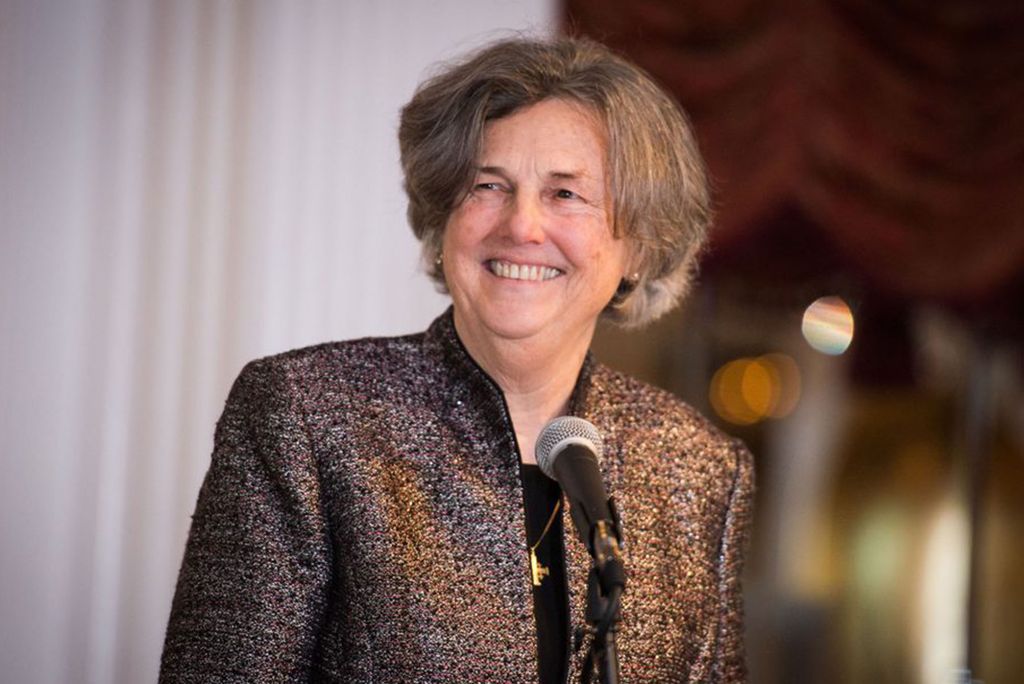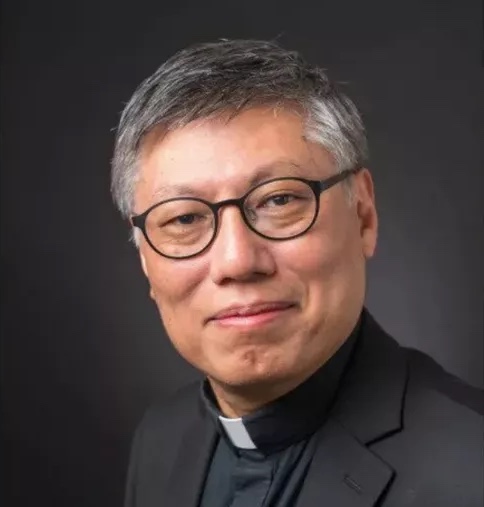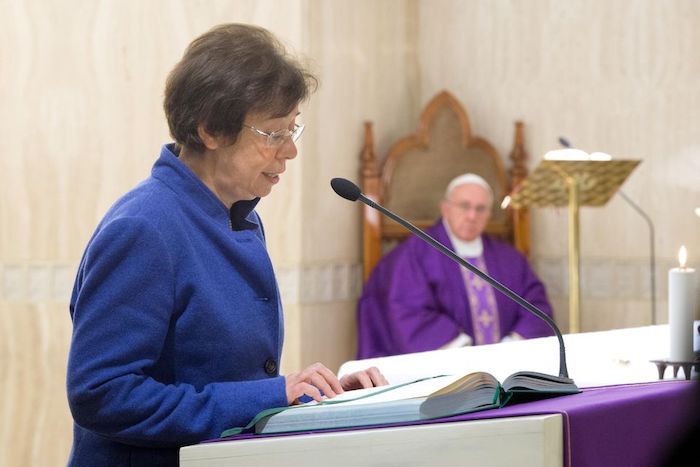Yes, says renowned expert Phyllis Zagano (COM’70), as Vatican ponders the issue

By Rich Barlow
In 2020, Pope Francis created a second Vatican commission to consider ordaining women as deacons—clergy who may read the gospel and preach at Mass, baptize, witness marriages, preside at funerals, and work with the needy. (A prior commission had ended two years earlier with no action taken by the Vatican.) One media report said the move signified that “women deacons in the Catholic Church are closer to reality than ever before.”
Correction: women deacons were reality in the early church. The diaconate, male and female, was abolished in the Middle Ages, then restored for men only by the Second Vatican Council in the 1960s as “a ministry of service.”
Phyllis Zagano (COM’70), a scholarly authority on, and advocate for, women deacons, served on the first iteration of the pope’s commission. Her new book, Women Religious, Women Deacons: Questions and Answers is a collection of five essays for women in religious orders who aspire to the diaconate. She wrote a longer book on the topic, Women: Icons of Christ, published in 2020. A Hofstra University adjunct professor of religion and a senior research associate in residence, Zagano summarized her argument for Bostonia.

Q&A
With Phyllis Zagano
Bostonia: What’s the case for ordaining women deacons?
Phyllis Zagano: We have a great history of women ordained as deacons in Christianity up until the 12th century. You’ll remember that Phoebe, in Romans 16:1-2, is introduced by St. Paul; she is the only person in scripture with the job title “deacon.” What the church has done, the church can do again.
Why did deacons go away? Basically because they controlled the money, and they were very, very, very powerful between the 10th and the 12th century, particularly in Rome. The priests did not like the deacons. They wanted to get rid of the deacons. As you move through the 10th, 11th, 12th centuries, no one who is not eligible to become a priest is ordained a deacon. So there was no more permanent diaconate.
In 1976, a [church] document said women can’t be priests because Jesus chose male apostles, and secondly, women can’t image Christ. Then in 1994, another document said we can’t ordain women as priests because Jesus chose male apostles. Where did the argument that women can’t image Christ go? They dropped it. [Opponents of women deacons] say they can’t be sacramentally ordained because they can’t image Christ. They’re overlooking the fact that the argument about imaging Christ has been dropped.
Bostonia: You write, “Is the church capable of seeing women—both secular and religious women—as bearers of the gospel and as icons of Christ?” What if the answer is no? Can misogynists in the church be overcome?
Phyllis Zagano: One would hope so. I was on the commission for the study of women in the diaconate for two years. I was seated at lunch across from a Congregation for the Doctrine of the Faith official. I said, “Why can’t women be ordained as deacons?” He said, “Because women can’t image Christ.” I said, “Watch me.”
[His was] an heretical statement: I don’t see Christ in you, I don’t see Christ in the woman next door, the little boy, and—God help me—in Putin. The Incarnation comes to us every day, and the Resurrection comes to us every day. For them to deny the ability of women to be sacramentally ordained as deacons because women can’t image Christ—they have left the church. I haven’t. That is an example of clericalism, the understanding that I belong to a special group and you don’t.
I think misogyny in the church must be overcome. Students and young people will not deal with an organization where women are either mistreated or ignored.
Bostonia: Could diaconal ordination for women increase the church’s problem with clericalism?
Phyllis Zagano: It depends on the personality. If you’re worried about clericalism, you should have no clerics. But we need clerics. We need individuals who will serve the people of God.
Bostonia: Some critics might say that absent priestly ordination, women will inevitably be second-class citizens. How would you respond?
Phyllis Zagano: [Traditionalists fear that] if you can sacramentally ordain a woman as a deacon, you can sacramentally ordain her as a priest, and eventually ordain her as a bishop. And I say, then you don’t believe church teaching. The church teaches that it does not have the authority to ordain women as priests [because Jesus chose only male apostles]. If you say they can, that’s your argument, not mine.
The church needs ministry more than it needs priests. It needs ministry of charity. It is assumed that only priests can have governance and jurisdiction in the church. Actually, a cleric can have governance and jurisdiction, and a deacon is a cleric.
Who would you prefer to preach—the priest who talks about his golf game and Netflix, or the deacon who talks about running the soup kitchen? Not to begrudge priests, but I do want to hear, once in a while, the deacon who has been in prisons and ministering to people there, who has been in the hospitals visiting the sick, who is teaching catechism to five-year-olds. You need to look at the diaconate not as deacon-priest-bishop, but rather the deacon works for the bishop and the priest works for the bishop. These are separate but equal orders.
Women deacons did participate in baptism, whereas male deacons didn’t for the most part; women deacons did visit the sick. Women deacons also anointed ill women; male deacons never anointed. There are sacraments that, historically, women deacons performed that men deacons never did and still can’t do. It’s not that women are second-class citizens. It’s that the church has not appropriated the full understanding of what the diaconate is.
Bostonia: What is the likelihood that the current deliberations will result in Francis approving women’s diaconal ordination?
Phyllis Zagano: Because I do not know what the new commission is tasked with, I cannot predict what effect their work might have. I do know that the restoration of women to the ordained diaconate is a topic of serious synodal discussion around the world.
Complete Article ↪HERE↩!




